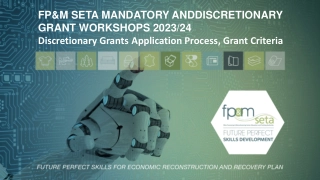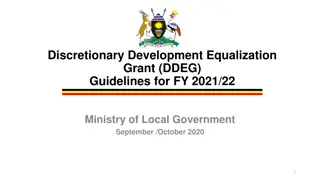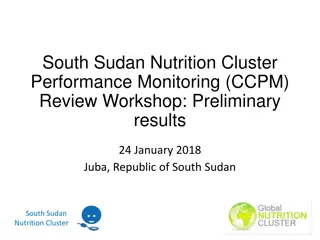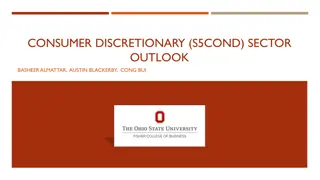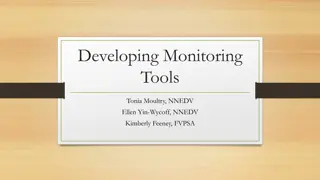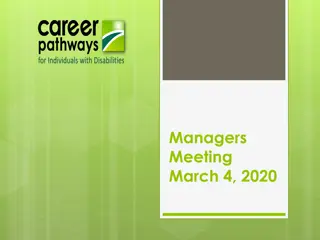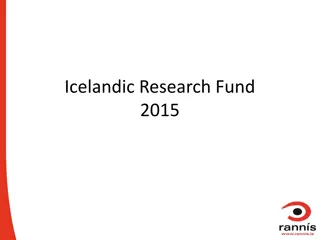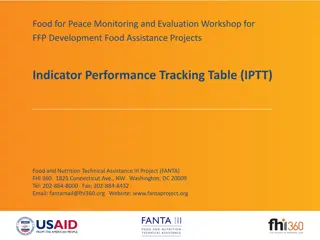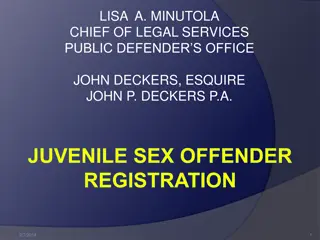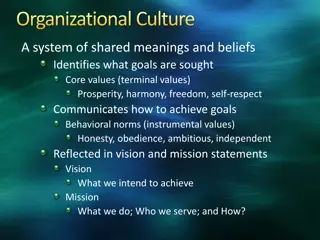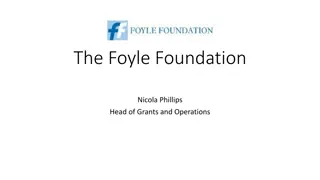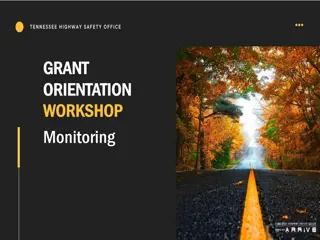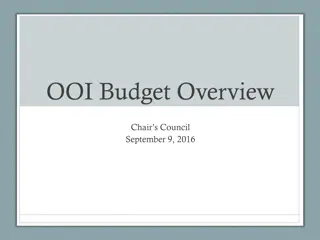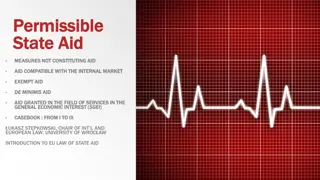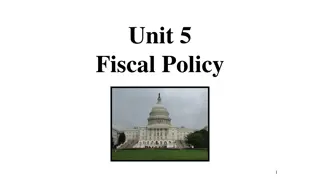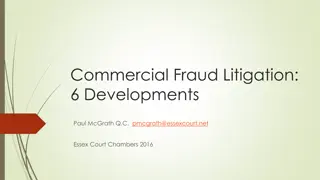Enhancing Monitoring and Evaluation for Discretionary Grants Workshop
This presentation focuses on the impact of COVID-19 on Monitoring and Evaluation (M&E) and risk management in the implementation of Discretionary Grants Projects. It highlights the need for a robust M&E strategy for project management and compliance with accreditation criteria. The session discusses the use of independent Sector Skills Advisors for unbiased perspectives, risk-based site visits, and online checklists for project monitoring during the COVID-19 lockdown. Requirements to qualify as a Sector Skills Advisor are also outlined.
Download Presentation

Please find below an Image/Link to download the presentation.
The content on the website is provided AS IS for your information and personal use only. It may not be sold, licensed, or shared on other websites without obtaining consent from the author. Download presentation by click this link. If you encounter any issues during the download, it is possible that the publisher has removed the file from their server.
E N D
Presentation Transcript
FP&M SETA Discretionary Grants Workshop MONITORING AND EVALUATION 2022 - 2023
Regulatory Compliance In this presentation we consider consequences of COVID-19 on: M&E Risk management in the implementation of DG Projects during COVID-19 pandemic
Monitoring & Evaluation The Organisation has implemented a fully functional and robust monitoring and evaluation strategy, amongst others, to enhance project management of the DG funded projects and compliance of the Skills Development Providers with their accreditation criteria. The services of the independent Sector Skills Advisors (SSA) are used with a view to obtaining an objective perspective on the discretionary grant projects implementation and the compliance of the Skills Development Providers with their accreditation criteria. Risk-based site visits are conducted for each specific complaint reported. Reports from Monitoring and Evaluation are analysed and risks identified. Audit findings tracking tool developed to track effectiveness of controls implemented and to ensure that risks are mitigated.
Online Monitoring & Evaluation Current System In light of the nationwide lockdown brought on by the prevalence of COVID-19 pandemic, the Division has developed and implemented an On-Line Checklist for the monitoring of the SETA funded Discretionary Grant funded projects/ contracts. The On-Line Checklist for COVID-19 verifies the projects that are being implemented during the COVID-19 Lockdown. The On-Line Checklist is sent to the Stakeholder to complete and to submit it together with the required relevant supporting documents. Given the COVID-19 Lockdown restrictions, the verifications have been conducted by the Internal Team and SSA s are not currently conducting site visits.
REQUIREMENTS TO QUALIFY AS AN SECTOR SKILLS ADVISOR The following would be the minimum requirement for an individual/organization to be considered a Monitoring and Evaluation Sector Skills Advisor. The potential candidate must have a Diploma/Certificate or an equivalent in the field of Education and Training Education and Training Practitioner- Facilitator, Assessor, Skills Development Facilitator, Moderator, Coach, Mentor, SETA experience Minimum of three (3) years practicing in the above stated. Good Interpersonal Skills Good Communication Skills Ability to conduct site visits Ability to write and submit reports Be a South African or Permanent Resident of South Africa No criminal record Have his/her own basic working tools/facility laptop Have his / her own transport
Sector Skills Advisors SSAs (External Moderators) Requirements to Qualify as an Quality Assurance Sector Skills Advisor: 03 Years Technical industry experience OR ETD Course or equivalent with 5 years skills development experience. 5 Years technical industry experience OR ETD Course or equivalent with 3 years skills development experience. Less than 3 years technical industry experience studying towards formal EDT qualification Where do we need SSA s: Western Cape, Northern Cape, Eastern Cape, Free State and North West What are the expectations: Conduct accreditation visits, external moderations (complete reports as per the prescribed template) Attend workshops and meetings. Assist stakeholders with challenges regarding learner capturing, learners selection etc. Provide advice to stakeholders when requested.
EXPECTATIONS FROM STAKEHOLDERS For Monitoring of Discretionary Grant Funded Projects, the following supporting documents are required: Duly signed MoA/Annexure/s for all approved DG projects Implementation Plan for all approved projects Outsourcing Agreement if any Proof of learner/s registration onto the MIS Proof of utilization of Accredited Education and Training Development Practitioners Proof of Service Level Agreement with ETD Practitioners if any Learners Portfolio of Evidence(PoE)/Logbooks Proof/Record of Learner Allowance payment Proof of Accreditation (NAMB/QCTO) and or Workplace Approval Copy of Learning Material used Signed Attendance Registers Close Out Report for closed projects
Risks The FP&M SETA, through its Monitoring and Evaluation Division, is obliged to monitor the implementation of the projects and check whether or not approved applicants are compliant with the requirements of the project. Below are some typical examples of risk areas identified during the M&E process: Learner stipend/allowance to be paid by all stakeholders. Some stakeholders are not conducting proper and thorough Induction Non-availability of stakeholders for M&E. Compliance with the terms and conditions of the agreed and signed MOA. Timeous submission of accurate and complete information. Compliance with approved FPM SETA policies.


